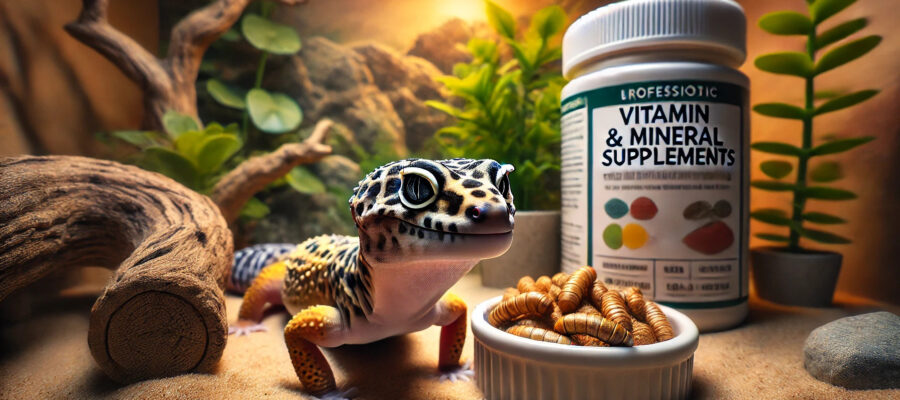If you want your leopard gecko to live a long, healthy life, giving them the right vitamins and minerals is essential. Just like us, these little reptiles rely on specific nutrients to keep their bones strong, their skin healthy, and their energy levels up. Let’s dive into what they need, how often to provide it, and a few easy tips for making sure they’re getting their daily dose.
Why Supplements Matter for Leopard Geckos
In the wild, leopard geckos hunt insects full of nutrients from their natural environment. But pet insects don’t quite measure up—meaning without supplements, your gecko might miss out on important nutrients. By adding a few key vitamins and minerals to their diet, you help fill in those gaps.
Calcium: The Backbone of Their Diet
Calcium is the single most important mineral for leopard geckos. Why? Because it keeps their bones strong and prevents metabolic bone disease (MBD), a common condition caused by calcium deficiency. Without enough calcium, geckos can develop weak, deformed bones that make it hard for them to move around.
So, how do you make sure your gecko gets enough calcium? Many pet owners dust their gecko’s food with calcium powder three to four times a week. But if you’re new to this, don’t worry—it’s easier than it sounds. Simply place your insects in a small bag with the powder, give it a shake, and then serve.
For more tips on dusting and food options, check out our Beginner’s Guide to Leopard Gecko Feeding.
Vitamin D3: Helping Them Absorb Calcium
Vitamin D3 is another crucial nutrient because it helps your gecko absorb calcium effectively. Even if you provide calcium, without D3, they may not be able to use it properly. In the wild, geckos get D3 naturally from sunlight, but in a tank environment, they usually need a bit of help.
It’s typically recommended to dust their food with a calcium + D3 powder once or twice a week. Be careful not to overdo it, though, as too much D3 can be harmful. Look for a balanced supplement that includes both calcium and D3 in the right proportions, and you’ll be set.
Multivitamins: Covering All the Bases
While calcium and D3 are essential, your gecko also benefits from a few extra vitamins for optimal health. A multivitamin powder can help ensure they’re getting a little bit of everything, from Vitamin A (good for eyesight and skin) to other trace minerals.
But don’t go overboard! Too much supplementation can be just as harmful as too little. Dusting with a multivitamin once a week is usually enough for most leopard geckos.
How to Make Supplements Part of Their Routine
Establishing a supplement routine is easy with a little planning. Here’s a simple schedule many gecko owners use:
- Calcium (without D3): 3-4 times a week
- Calcium + D3: Once or twice a week
- Multivitamin: Once a week
Using a shallow dish can help if your gecko doesn’t eat all their insects at once. Place the dusted insects in a dish, and whatever they don’t finish you can easily remove.
Don’t Forget About Gut-Loading
Another way to boost your gecko’s nutrition is by gut-loading the insects. This means feeding the insects nutritious food (like leafy greens and carrots) 24 hours before giving them to your gecko. Gut-loading enhances the insects’ nutrient content, giving your gecko an even richer meal.
For more details on how to gut-load, check out The Easy Way to Keep Your Feeder Insects Hydrated.
Watch for Signs of Deficiency
How do you know if your gecko is getting the right nutrients? Some signs can clue you in. If you notice your gecko is lethargic, has weak or wobbly movements, or develops soft, bending limbs, it could indicate a deficiency—especially in calcium.
If you’re ever in doubt about their health, a visit to a reptile-savvy vet is always a good idea. A quick check-up can ease any worries and help you adjust their diet if needed.
Wrapping It Up
Providing the right vitamins and minerals for your leopard gecko is simpler than it seems. With a bit of calcium, a sprinkle of D3, and a dash of multivitamins each week, you’ll be giving them everything they need to thrive. Set a schedule, dust their food, and don’t forget to gut-load those insects. It’s a small effort that makes a big difference in their health and happiness.
Get Your Free Leopard Gecko Care Checklist!
Are you ready to give your leopard gecko the best care possible? Download our FREE PDF e-book featuring a comprehensive care checklist!
This handy guide covers everything from habitat setup to feeding and health tips, ensuring your gecko thrives.
👉 Download your checklist now!




